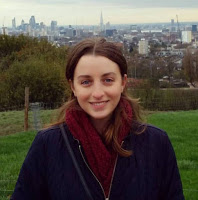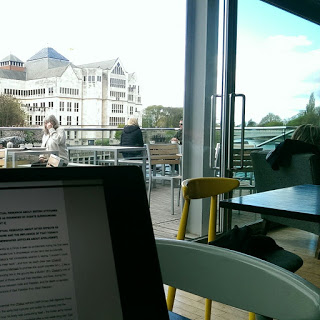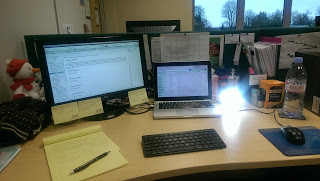I am Hannah Kershaw and This is How I Work
 Today, I have the pleasure of inviting Hannah Kershaw to the “How I Work” series. Hannah is a PhD student at the University of York, UK. She completed her BA in English at the University of Southampton, and her MA in Postcolonial Literature at the University of York. Her interdisciplinary thesis is entitled ‘Multiculturalism, Culture, and Controversy: Representations of Multiculturalism in Contemporary British Muslim Fiction’, and is funded by the Economic and Social Research Council.
Today, I have the pleasure of inviting Hannah Kershaw to the “How I Work” series. Hannah is a PhD student at the University of York, UK. She completed her BA in English at the University of Southampton, and her MA in Postcolonial Literature at the University of York. Her interdisciplinary thesis is entitled ‘Multiculturalism, Culture, and Controversy: Representations of Multiculturalism in Contemporary British Muslim Fiction’, and is funded by the Economic and Social Research Council.
Current Job: Doctoral researcher in the Department of Politics (co-supervised with the Department of English and Related Literature) at the University of York.
Current Location: York, UK
Current mobile device: HTC One
Current computer: MacBook Pro (early 2011) and Acer Chromebook
Can you briefly explain your current situation and research to us?
I’m a third-year PhD student and am co-supervised by the Department of Politics and the Department of English and Related Literature. My thesis explores, through both political discussion and literary analysis, how contemporary British Muslim fiction engages with multiculturalism. My research project is funded by the ESRC WRDTC network ‘Reshaping Multiculturalism through Cultural Practices’, a highly interdisciplinary network supported by academics in Politics, English Literature, Human Geography and Sociology from the universities of York, Leeds, and Sheffield.
My research specifically asks how British authors of Muslim heritage use history and memory in their narratives. Theories of memory and trauma are often used when researching Holocaust testimonials, but I argue that with this approach we can learn two things. Firstly, how today’s British Muslims understand their postcolonial and global identities, and secondly, how we can strive towards an understanding of a collective British identity as inherently and historically multi- rather than mono-cultural.
What tools, apps and software are essential to your workflow?
For writing I use Microsoft Word, as you’d expect, and for referencing I use Endnote. I don’t like the Cite While You Write feature, so I just use it to make a bibliography at the end of each chapter and then clear it of any formatting.
I use Wunderlist on both laptops and my phone, but only when I feel overwhelmed enough to need a written to-do list.
I also use Scrivener sporadically, as I find drafting in Microsoft Word feels a little unnatural, whereas Scrivener feels more like a scrapbook. I’d recommend it if you’re struggling to write as it has a little progress bar at the bottom that tells you how much you’ve written (or not written!) in a particular session.
I’ve used Evernote religiously for years as a sort of diary. Having it on my phone means I can jot down ideas whenever and wherever. I’m also a big fan of background music websites such as www.asoftmurmur.com (free), www.soundrown.com (free), and www.focusatwill.com (no longer free).
What does your workspace setup look like? Do you have a fixed workspace, or do you alternate between a home office, university office and lab?
I have a very generous desk space in the social sciences research centre on the main campus, alongside a set of three drawers and plenty of bookshelves. I like to have somewhere to ‘nest’, so all of my work is there in order to ensure that my home space is for relaxation rather than work. My set up is my Macbook hooked up to an external monitor. I also have a mini light therapy lamp on my desk, which I keep switched on all morning to help keep my energised and awake. I tend to use my desk 4 days a week, then use 1 or 2 days a week to have a change of scenery, usually in a local café.
 |
| café workspace |
 |
| desk workspace |
What is your best advice for productive academic work?
Spend time figuring out how you work, not how other people work or how you think you ought to work. I know plenty of people who stick to a 9-5 day, and if that works for them then great! I don’t like to be that strict, because whenever I’ve tried I’ve ended up sitting at my desk feeling tired and unmotivated.
I’ve realised that for me personally, I have to listen to my body. If I feel I need a walk, a nap, a day off, I just do it and then make up the time when I’m feeling more motivated. As long as you’re on track with your goals, I don’t think it matters when or how you work.
But so far, being kind to myself has helped me be productive when I need to be and continue to enjoy, rather than resent, the work!
How do you keep an overview of projects and tasks?
I don’t really use any technology for keeping track of my project, I just jot things down on paper and pin them up, or write things on post-it notes. However, I do print off a calendar page for every month and plan the dates I want to get certain tasks done by, and then pin it up at my desk so that I have a rough schedule for each month.
Besides phone and computer, do you use other technological tools in work and daily life?
My supervisor always raves about her Kindle, so I bought one and have found it extremely useful. I put academic articles (PDFs) on it and read them on train journeys or when I’m sitting in a doctor’s waiting room, for example. It’s a lot easier than carrying around paper.
As I study novels, I have paper copies and Kindle copies. With the Kindle copies I can search for recurring words and phrases, highlight sections then print the highlights off, add my own notes, and lots of other things.
Which skill makes you stand out as an academic?
I’m not really sure yet, as I’m still only in the PhD stage. I taught for the first time in 2015 and was better at it than I thought I would be. I’m also quite good at time management and keeping up a good writing pace. I like to think I’m also approachable and a nice person (I hope) so can develop good relationships with academics and students.
What do you listen to when you work?
Usually sounds from the website mentioned above. My personal favourite is heavy rain as it really relaxes me. When everything feels a bit too quiet, I put on the coffee shop sounds! I don’t often listen to music with vocals whilst working, unless I’m doing something like browsing journals or organising a bibliography.
What are you currently reading? How do you find time for reading?
In terms of the PhD, I’m currently rereading Salman Rushdie’s The Satanic Verses for my current chapter. In the evenings, I’m reading Leila Aboulela’s The Translator, and I listen to audiobooks in bed – currently Jane Austen’s Emma. I’ll be reviewing two books for a journal soon, so once they arrive they’ll replace my evening reading I imagine.
Are you more of an introvert or extrovert? How does this influence your working habits?
I think I’m an ambivert, leaning towards introvert. I’m happy to socialise and I don’t even mind doing presentations too much, but I have my limits! I do enjoy spending most days working on my own (albeit in a shared office). I don’t really get lonely or bored.
For me, the most difficult part of PhD life has been networking and going to conferences, and I find it very hard and nerve-wracking to talk to people that I don’t know. It just doesn’t come naturally to me. But when I’m eventually comfortable and relaxed around someone, I never shut up!
What’s your sleep routine like?
I don’t really have a routine; I just sleep when I’m tired. I do try to be up by 8:30am though. I got a Lumie for Christmas and it’s true that being woken up by light rather than sound is far less grating!
What’s your work routine like?
I don’t have much a routine for this either. When I have a whole day free, I try to work from about 10am – 4:30pm at my desk, and usually I get lots done in that time. When I have other things going on, like conferences or exam invigilating, I just try to work when I get a chance.
I don’t go lengthy amounts of time without doing thesis work, because then I lose momentum and get anxious. I try and do a bit every day.
The only “routine” I have is a traffic light system that I use (suggested by my mum during my A-Levels and used ever since!). I write a list of tasks that I want to get done that day, then I mark them as red, amber or green. Red would be the most difficult work, such as writing or rewriting; amber would be medium difficulty, such as chapter planning or reading a journal article; and green would be easy work such as a putting together a bibliography or making a reading list. It means you can respond to your energy levels and adjust your work accordingly. So in the morning I do red work (when I’m the most energetic), after lunch I do green work (the carbohydrate slump), then in the afternoon I do amber (the post-biscuit and caffeine energy spike).
What’s the best advice you ever received?
Just keep writing!
